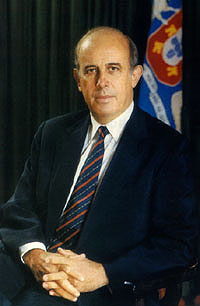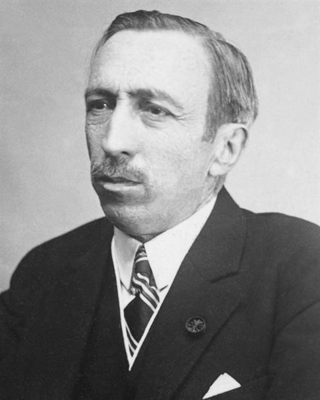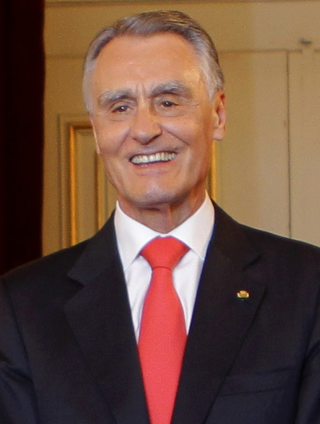
Politics in Portugal operates as a unitary multi-party semi-presidential representative democratic republic, whereby the Prime Minister of Portugal is the head of government, and the President of Portugal is the non-executive head of state which, although it is a somewhat ceremonial figure, has some significant political powers they exercise often. Executive power is exercised by the Government, whose leader is the prime minister. Legislative power is primarily vested in the Assembly of the Republic, although the government is also able to legislate on certain matters. The Judiciary of Portugal is independent of the executive and the legislature. The President exerts a sort of "moderating power", not easily classified into any of the traditional three branches of government.

The prime minister of Portugal is the head of government of Portugal. As head of government, the prime minister coordinates the actions of ministers, represents the Government of Portugal to the other bodies of state, is accountable to parliament and keeps the president informed. The prime minister can hold the role of head of government with the portfolio of one or more ministries. As Portugal is a semi-presidential parliamentary republic, the prime minister is the country's leading political figure and de facto chief executive.

Mário Alberto Nobre Lopes Soares was a Portuguese politician, who served as prime minister of Portugal from 1976 to 1978 and from 1983 to 1985, and subsequently as the 17th president of Portugal from 1986 to 1996. He was the first secretary-general of the Socialist Party, from its foundation in 1973 to 1986. A major political figure in Portugal, he is considered the father of Portuguese democracy.

The Socialist Party is a social-democratic political party in Portugal. It was founded on 19 April 1973 in the German city of Bad Münstereifel by militants who were at the time with the Portuguese Socialist Action. The PS is a member of the Socialist International, Progressive Alliance and Party of European Socialists, and has eight members in the European Parliament within the Progressive Alliance of Socialists and Democrats group during the 10th European Parliament.

The president of Portugal, officially the president of the Portuguese Republic, is the head of state and highest office of Portugal.

Vasco Joaquim Rocha Vieira, GCTE GCC GCIH ComA, is a retired Portuguese Army officer who was the last Governor of Macau.

Pedro Miguel de Santana Lopes is a Portuguese lawyer and politician, who is the current mayor of Figueira da Foz. He most notably served as prime minister of Portugal from 2004 to 2005.

João Barroso Soares is a Portuguese editor and Socialist Party politician, who was President of the Municipality of Lisbon from 1995 to 2002.

The 2005 Portuguese legislative election took place on 20 February. The election renewed all 230 members of the Assembly of the Republic.

The 1976 Portuguese legislative election was held on Sunday 25 April, exactly one year after the previous election, and two years after the Carnation Revolution. With a new Constitution approved, the country's main aim was economic recovery and strengthening its democratic institutions. The election renewed all 263 members of the Assembly of the Republic.

The National Salvation Junta was a group of military officers designated to maintain the government of Portugal in April 1974 after the Carnation Revolution had overthrown the Estado Novo dictatorial regime. This junta assumed power following a communiqué of its president, António de Spínola, at 1:30 a.m. on 26 April 1974. The National Salvation Junta was the de jure governing body of Portugal following the Carnation Revolution.

Victor Hugo de Azevedo Coutinho, 18th Count of Azevedo GCC, GCA, was a Portuguese naval officer, politician and professor, at the University of Coimbra and later the Escola Naval. He was a member of the Portuguese Democratic Party and served as the President of the Council of Ministers for the 7th government of the First Portuguese Republic. His government's composition was essentially made up of second-line political figures, and his government was jokingly referred to as "Os miseráveis de Victor Hugo", a play on the French author Victor Hugo's book Les Misérables.

Hugo Miguel Almeida Costa Lopes is a Portuguese professional footballer who plays as a right-back for C.F. Estrela da Amadora.

Presidential elections were held in Portugal on 23 January 2011. The elections resulted in the re-election of Aníbal Cavaco Silva to a second term as President of Portugal. Turnout in this election was very low, where only 46.52 percent of the electorate cast their ballots. Cavaco Silva won by a landslide winning all 18 districts, both Autonomous regions of Azores and Madeira and 292 municipalities of a total of 308.

Events in the year 1995 in Portugal.

Regina Maria Pinto da Fonseca Ramos Bastos is a Portuguese lawyer and politician. She was a member of the European Parliament from 1999 to 2004 and from 2009 to 2014 as a member of the European People's Party.

Presidential elections are scheduled to be held in Portugal in January 2026. The election will elect the successor to President Marcelo Rebelo de Sousa, who is barred from running for a third term. Every Portuguese President since carnation revolution has been re-elected for second term but only one, Mário Soares (PS) ran for a non-consecutive third term in the 2006 Presidential Election and lost, making it that every Portuguese President since the carnation revolution of 1974 has been exactly two terms in office.
















